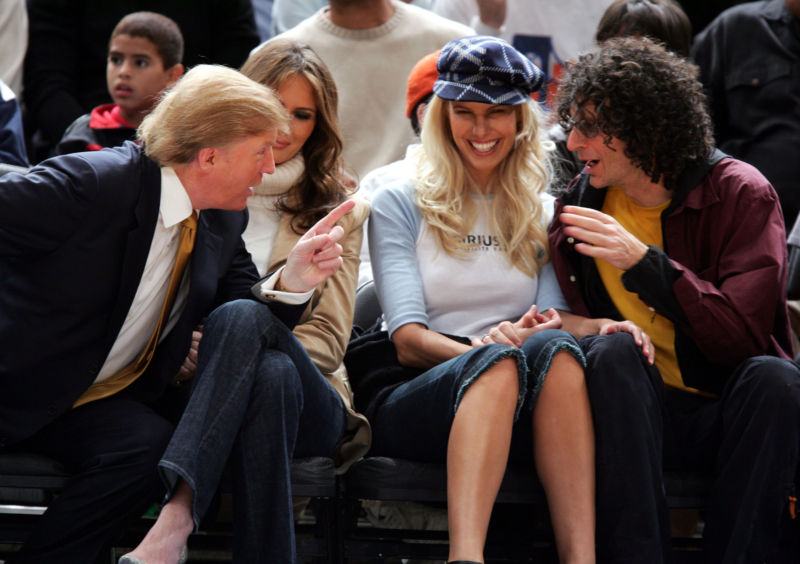
On Wednesday afternoon, roughly 48 hours after it was put up, the audio trove has been removed from YouTube and SoundCloud. For now, the transcripts remain on Factba.se, a website created by the startup FactSquared.
Factba.se published a total of around 15 hours' worth of audio—exclusively of the minutes when Trump was on The Howard Stern Show—gathered from nearly 25 years of shows, starting in 1993 and ending in 2015.
"We were in the process of putting [the audio files] on our own server, but then FedEx showed up and that was the official stop," Bill Frischling, the CEO of FactSquared, told Ars. "So we had a good conversation with our attorneys today, and we’re going to be reaching out to [SiriusXM’s attorneys] pretty darned soon. We’ve already exchanged brief notes, everybody is hoping to get it resolved amicably. Our goal is to preserve the record. At least right now, this is the only public version of a massive, quarter-century trove of interviews."
Under the DMCA, intellectual property holders (such as SiriusXM, which airs The Howard Stern Show) can send a takedown notice asserting a violation of copyright. Most large companies, including Google (the owner of YouTube) will comply with such requests.
All’s fair use in love and war?
Because FactSquared only published the portions of the Stern Show that involved Trump—and not wholesale copies of shows—the startup could make a solid fair use claim under US copyright law. Fair use is the portion of the law that allows portions of copyrighted works to be re-published without the copyright holder’s permission, subject to particular conditions, including news commentary, satire, and others."Based on the facts you’ve presented, Factba.se would appear to have a strong fair use argument," Jonathan Band, who helped author the DMCA back in 1998, told Ars by e-mail. Band is a law professor at Georgetown University.
"What [Factba.se] would need to do is submit a counter-notice to YouTube/SoundCloud under the DMCA, asking for the content to be restored. YouTube/SoundCloud likely would then repost the content if SiriusXM didn’t file suit against Factsba.se for infringing copyright by posting the content in the first place."
Attorney Kit Walsh of the Electronic Frontier Foundation agreed.
"Factba.se would have a very strong fair use case based on the newsworthiness of the recordings and the analysis that they did," she told Ars. "The recordings are the data that underlies their findings, and reproducing the recordings is essential to the credibility of their analysis and the ability of others to reproduce and build upon that analysis."
However, law professor Eric Goldman of Santa Clara University told Ars that the situation might not be as clear cut. He called this particular set of facts a "hard case for fair use."
"What would make it easier [is] if there was more commentary or context around the material," Goldman said, explaining that simply posting the transcript and some basic keyword searches and analysis may not fall under the commentary portion of fair use.
If Factba.se had done what other news sites have already done—written entire articles about revelations from this trove—it could be an easier claim.
"I think they could qualify for a fair defense," Goldman added. "I think it’s still possible, but it’s harder than another set of circumstances."
Similarly, Wendy Seltzer, an attorney to the World Wide Web Consortium and founder of the Lumen Database (formerly Chilling Effects, which keeps track of DMCA notices), said that she was pretty convinced that it is a fair use case.
"People aren’t substituting away from the current show to these transcripts," she told Ars. "They’re reading or listening to these excerpts for a fundamentally different purpose. The purpose and character of the use is for informing oneself about the news and not for the same entertainment purpose or newsworthy purpose at the time as when they were originally published or broadcast."
Down a Stern-shaped rabbit hole
Frischling also said he be would happy if SiriusXM or Howard Stern simply published the audio on their own websites.Earlier this year, FactSquared had solicited Reddit and other Stern fan sites to obtain copies of all the shows on which Trump had ever appeared, largely as a public service. Bootleg Stern recordings freely circulate on BitTorrent, among other online venues.
While other media outlets had referred to some snippets, no one had made available the full archive before. It wasn’t until early September that someone anonymously e-mailed a Dropbox link with all of the audio files of the entire shows where Trump appeared. Frischling’s company’s software transcribed, analyzed, and linked this cache in an entirely new way.
"If you take that and look at that, Howard Stern had spoken with Trump more than anybody else, over a wider period," Frischling added. "A quarter century, same person, same relationship, quarter century. Stern is a phenomenal interviewer. He gets people to say things that they’ve never said before."
While FactSquared offers similar types of text, audio, and video analysis to corporate clients, the Trump archive was freely made available.
SiriusXM did not immediately respond to Ars’ request for comment.
reader comments
96